Reviews & Articles
讓香港做香港 | Letting Hong Kong Be Hong Kong
John BATTEN
at 2:52pm on 27th July 2020
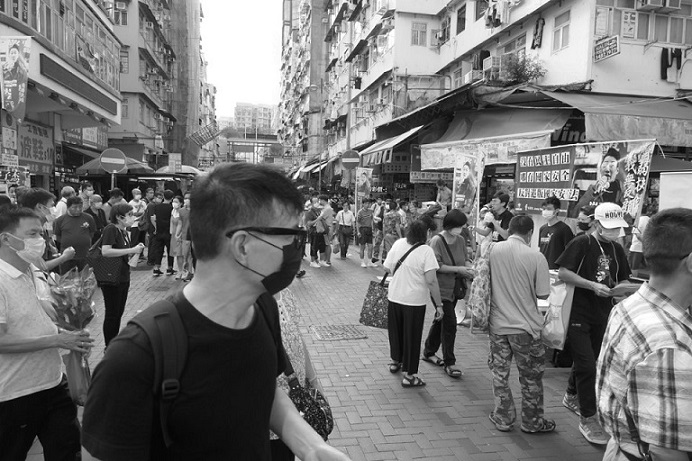
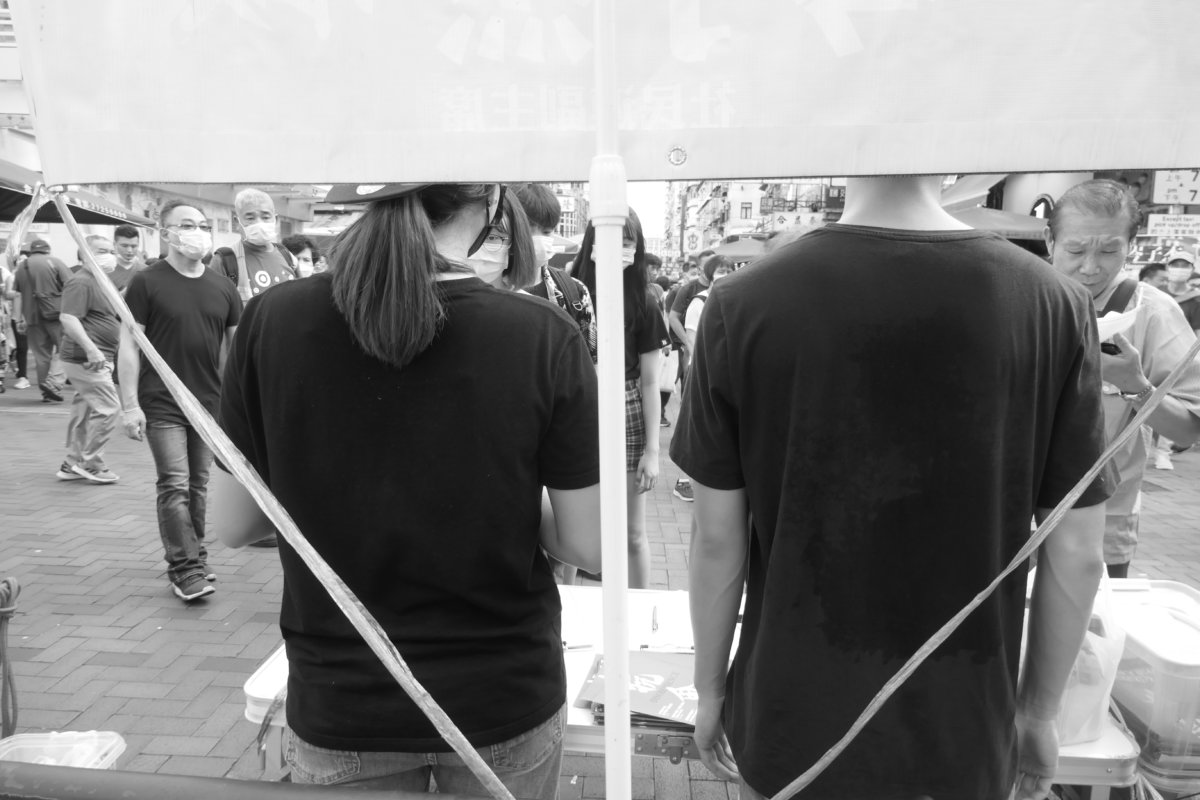
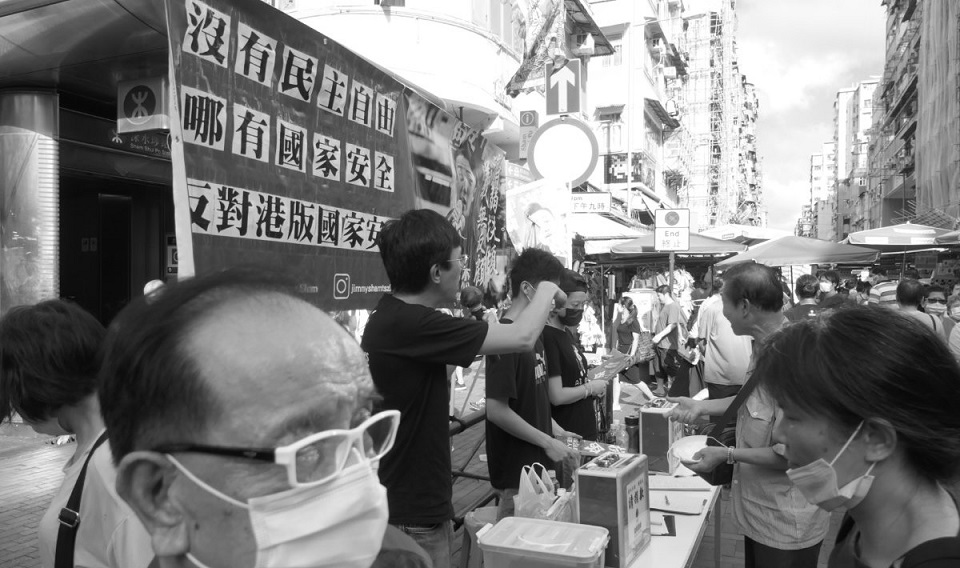
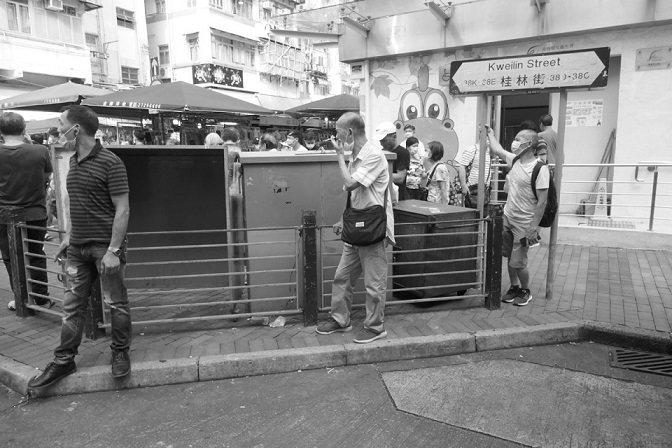
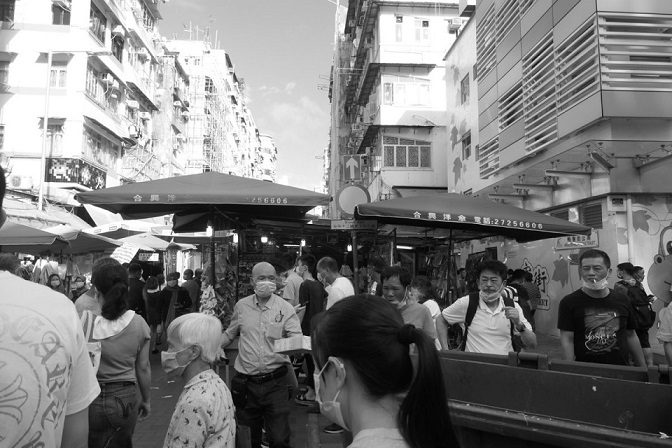
圖片說明:
1.-5. 2020年6月14日,香港,九龍,深水埗,街頭拉票和路人圍觀。圖片由作者提供
Caption:
1.-5. Street campaigning and watched by bystanders, Sham Shui Po, Kowloon, Hong Kong, 14 June 2020. All photos: John Batten
(Please scroll down for English version)
去年在某幅牆上首次看到「Let Hong Kong Be Hong Kong」(讓香港做香港)這句言簡意賅的口號時,我便非常喜歡。簡單的六個字,幾乎凝聚了所有和平遊行和暴力衝擊等街頭示威的訴求。這幾個字應該大量生產、用畫框裱起,然後掛遍香港。我城因政治取向分成兩邊的雙方都可以引用口號所蘊藏的民情,因為它全面捕捉了每一種對香港的主觀印象,不論是真實的還是構想的。這幾個字包含了人們對香港現在與過去的一致瞭解,特別是這裡擁有很多自由:這裡是很多人的家,包括那些在中國內地社會和政局波瀾洶湧時刻意離開內地來到香港及/或為了享受更好生活而以此為家的人;這裡擁有法治、商機處處,還充滿著創業精神、科技創新、不干預的政府,更領先著環球文化,特別是新聞、電影、粵語流行曲和電視娛樂方面。
然而,如果說它是應用得宜的口號,它僅涵蓋了真相的一面,無疑只觸及香港的優勢:「讓香港做香港」不會看到那些自願選擇住在籠般大小的家,又或困於悶熱且經常有蟲患的劏房的人。這樣一句口號有點像「中產美國」處境喜劇的情景,它們在亞洲被抄考成無數版本,劇中都以藍色的天空、人人開著又新又好看的汽車、整個家庭都是俊男美女,來寓意著一切都很美好。
儘管如此,「讓香港做香港」完美地概述了所有反政府示威者此刻所想要的。但是,這有可能嗎?我們可以回到12個月社會分化撕裂開始以前,然後忘記已訂立了國家安全法嗎?也許沒法子。
雖然香港當下的政治現實在中美冷戰越趨嚴峻時更形複雜,「讓香港做香港」會是選舉工程中獲政治集團採用的政治信息,這句口號暗示了人們對現屆政府政策的批評,也象徵著為確保香港繼續繁榮而主動推動的策略,帶著強烈的樂觀主義。事實上,它重提香港不太久遠的舊時代裡,特別是戰後令其成為亞洲四小龍之一的經濟動力。這句口號也可以由泛民派用於即將舉行的立法會選舉中。然而,近日舉行的泛民初選顯示陣營內將有各種候選人舉著民主派的旗幟。有些是政治和立法的素人,有些鮮有接觸政治策略的經驗,包括與政府進行持久協商和妥協。雖然如此,政府仍然必須願意參與協商和妥協。另外,泛民派互相合作的歷史也一點都不平坦:激進派和溫和派一直都只就一次過的議題或醜聞站在同一陣線,極少有效地就推進策略合作,也沒有怎樣因應改善香港採取強而有力的策略。這種做法較常見於朱凱廸等個別政治人物,他曾對土地政策和房屋改革,負起審議政府政策和決定的責任,並提供其他可行方案。
泛民太多時候全盤反對政府的政策和決定,而沒有透過努力研究和推廣新意念等手段,來就那些決定提供其他選擇。所有民主制度在立法機關內都有對戰的政治環境,並配合與政府各級和政策部門代表,就時下議題和長遠政策計劃進行激烈的社區辯論。香港只有在架構上有點形似。我們的立法機構因為功能組別的鎅票作用而扭曲,不再是真正的民意代表,而香港也有太多法定機構和諮詢委員會充斥著親政府或建制派人物。草根階層和「小市民」的聲音很少會在政府的決策中被聽見。制度本身不健全,也是香港連串反政府示威的根源。
有人猜測政府會取消或延期舉行本屆立法會選舉。如果事情果真如此發展,將會重新觸怒民憤,並引發新一輪國際譴責。這是不用花腦筋的選擇:假如我們在2019新冠病毒疫情的限制下仍能繼續乘搭擁擠的港鐵列車或巴士,那麼繼續選舉便不成問題。
誰又會知道2020年餘下時間香港會怎樣?然而,如果要在未來修補社會撕裂,政治根本上需要政府和泛民對話、協商、妥協。然後再對話、再協商、再妥協。而後再三繼續這樣做。只有那樣,「小市民」才能受惠,而不是繼續聽到吵耳的言論和承受施政無能的後果。
原文刊於《明報周刊》,2020年7月24日
Letting Hong Kong Be Hong Kong
by John Batten
I liked the slogan ‘Let Hong Kong Be Hong Kong’ the first time I saw it scrawled on a wall last year. It was simple and to the point. Those six words captured almost everything that the street protests, ranging from peaceful demonstrations to violent outbursts, demanded. Those words should be mass-produced, framed, and hung throughout Hong Kong. Both sides of Hong Kong’s divided political fence could equally refer to the words’ sentiment, as across the board it captures every subjective impression, real and imagined, about Hong Kong. In those words there is a universal understanding of what Hong Kong is and has been, particularly the ambience as a place of many freedoms: including as a home and refuge for those that intentionally left the mainland in times of social and political upheaval and/or for personal betterment; the rule of law; for business opportunities, entrepreneurship, innovation, government non-intervention; and worldwide cultural leadership, especially in journalism, film-making, Cantopop and television entertainment.
However, if it did become a well-used slogan, it would only encompass an aspect of the truth. It would inevitably only acknowledge the good in Hong Kong: ‘Let Hong Kong Be Hong Kong’ would not envision people who willingly choose to live in cage-homes or in stifling hot, often bug-infested subdivided flats. Rather, such a slogan is similar to “middle-America” television sit-coms, that have spurred countless copy-cat versions throughout Asia, where skies are always metaphorically blue, everyone drives new cars and the family is invariably beautiful.
Nevertheless, ‘Let Hong Kong Be Hong Kong’ is the perfect summation of what any anti-government protester wants right now. Is it possible, though? Can we roll back the last twelve months of social divisiveness and ignore the introduction of the National Security Law? Probably not.
But, despite Hong Kong’s current political reality (complicated by increasing Cold War rhetoric between China and the US), ‘Let Hong Kong Be Hong Kong’ would be the sort of political message adopted by a political bloc in an election campaign. The slogan implies criticism of current government policies, and presses a strong optimism for and augers a pro-active strategy to ensure that Hong Kong continues to prosper, indeed, it harks back to Hong Kong’s recent past, and especially its post-war economic dynamism as one of Asia’s tiger economies. It is a slogan that could be adopted by pan-democrats in the coming Legislative Council election. However, the recent democrat primaries indicate that the camp will have a range of candidates under the democrat banner. Some will have scant political or legislative experience. Some will have little exposure to political strategizing, including sustained negotiation and compromise with the government. Albeit, that the government must also be willing to engage in negotiation and compromise. Furthermore, the democrats have an uneven history of working together: radicals and moderates have tended to come together for one-off issues or scandals, but rarely worked effectively in promoting policies and adopting a cogent strategy of improvement for Hong Kong. It is more usual for individual politicians, such as Chu Hoi-dick on land policy and housing reform, who have led the charge to scrutinize government policies and decisions and offer alternatives.
The pan-democrats have too-often taken broad-brush opposing positions to government policies and decisions, rather than tackling those same decisions by offering alternatives through the hard work of research and spreading new ideas. All democracies have a combative political environment inside the legislature, complemented by vigorous community debate and representations to all levels of government and decision-making bodies on current issues and longer-term policy initiatives. Hong Kong has only the semblance of that structure. Our legislature is skewed from being a true representative of the people by the gerrymander of the Functional Constituencies and too many of Hong Kong’s statutory bodies and advisory committees are stacked with pro-government or establishment people. Hardly is the voice of the grass-roots and ‘small potatoes’ heard in government decision-making. The system is dysfunctional and is the root cause of Hong Kong anti-government protests.
There is speculation that the administration will cancel or postpone the coming Legislative Council election. If it does, it will reopen public anger and renewed international condemnation. It is a no-brainer choice: if we can continue to travel on crowded MTR trains or buses with current Covid-19 restrictions, then we can have an election.
Who knows what the rest of 2020 holds for Hong Kong. However, if there is to be future social reconciliation, the basics of politics require that the government and pan-democrats talk, negotiate, compromise. Then, again to talk, negotiate, compromise. And again, again. Only then will the ‘small potatoes’ benefit, rather than continuing to hear strident rhetoric and bearing the consequences of incompetence.
Originally published in Ming Pao Weekly, 24 July 2020. Translated by Aulina Chan.
